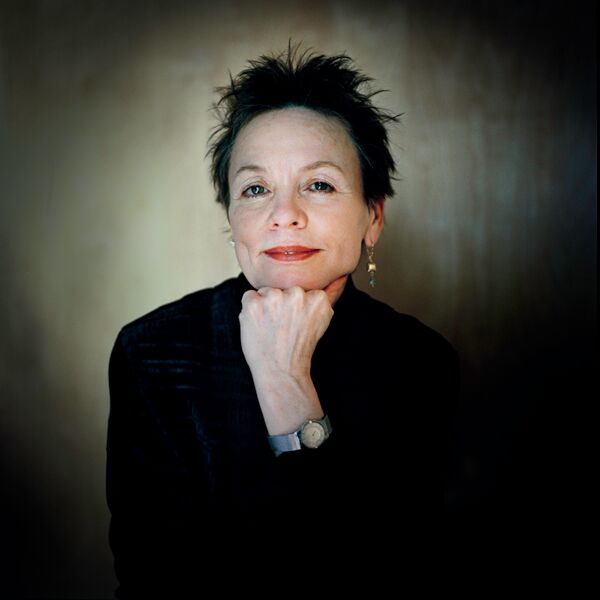What are the last things you see and say before you die and become dust? Do all oceans have walls? And why did the lark bury her father inside her own head?
All the Animals, a specially commissioned show for Brighton Festival, sees Laurie Anderson piecing together excerpts from earlier shows to make something that is more than the sum of its parts: a brand new work that presents a stunning cornucopia of stories and sounds; reworking mythical and fictional animal tales, and musing on our relationship with the natural world, but beyond that reflecting on the very nature of life itself. And death – death features heavily. Anderson’s bereavement (her husband Lou Reed died in 2013) is never specifically referenced, but it is there in the air, informing both her words and our receiving of them.
It’s a stripped-back Laurie Anderson show. The credits say it all: music, text and visual design Laurie Anderson; lighting design Brian Scott. That’s it – and it’s everything your heart could desire. As we enter the auditorium we see the vast stage lit by a projection of light on the whole-wall screen at the back of the stage. A beam of light is focused downwards on the lectern/music stand stage-left. There’s an armchair stage-right, and a row of small, twinkling lights marking the front edge of the stage.
The artist enters and immediately picks up her electric violin and launches into an intense opening number, fiery and passionate, layers of sound building through live multi-track sampling and modifying. At the end of the opening number, an electronic pulse remains as she then starts speaking – beautiful, poetic words that ricochet from her mother’s hallucinations pre-death (seeing animals on the ceiling) to Aristophanes’ The Birds, and the story of the lark who buries her father in her head – which is how memory came into the world.
Memory and imagination, archetype and myth: the stories tumble over each other. There are, roughly speaking, two performance modes. By the music stand, the delivery is poetic, lyrical and interweaved with music. The trademark vocoder-type voice distortion (which turns her voice into a deep masculine growl) is often employed – adding an extra surreal layer to the words. In one riff, she starts in with the fact that 99.9% of species that have ever lived are extinct, and takes this into an extensive list of what’s gone. Civets. Lizards. Sloths. Dinosaurs.
Sitting in the armchair, she’s in a more confessional storyteller mode – often telling stories about story-making. For example, we have a witty and entertaining spiel on the making of her opera, Moby-Dick. Anyone who knows and loves the book would, I am sure, have been as delighted as I was to hear her riff on Herman Melville’s imagined conversations with his editor – apparently Captain Ahab wasn’t in the first draft, and the book was even more ‘man goes fishing’ anoraky than it is in its final version. Talking of adaptations: there’s also a marvellous story of what Thomas Pynchon said when Laurie asked permission to turn Gravity’s Rainbow into a piece of music theatre. You can do it, he said, if you score it for solo banjo. ‘There are many ways to say no…’ she muses.
As she moves from one side of the stage to the other, sitting or standing, lighting states change. At one moment, she’s silhouetted against an Aurora Borealis pale green. At another, the stage is washed in deep violet light, with one deep magenta beam of light focused on her.
Back to the other side, and the violin sings out again. Next, a story of a prince’s funeral in Ubud. An enormous pyre is built, but then the body is dropped to the ground – apparently, the thud to the floor releases the soul, which flies away like a bird before the body is burnt. We move from birds to rabbits: a stuffed rabbit taken on a plane; and a Playboy bunny girl who berates Anderson and her demonstrating feminist friends with the suggestion that instead of objecting to women earning a good living, they turn their attention to the garment district where women work for 10 cents an hour.
And still the animals come: tigers, hamsters, horses, snakes, racoons, cows, donkeys. And dogs. Dogs are important to Laurie. When she speaks of her beloved Lulabelle she lights up with delight. Lulabelle sewn into her belly so she can birth her like a baby. Lulabelle poking her tongue up people’s noses. Lulabelle out for a walk, and seeing the vultures hovering above, realising that the danger can also come from above. The look on Lulabelle’s face, says Laurie, she saw again on people’s faces the day after 9/11. The awareness that we too can be prey – and that the hunters can come from the air.
It’s a sobering moment – but counter-balancing it is the story of Music for Dogs, which is just what it says on the can, a concert for dogs, held at Sydney Opera House. The piece was co-curated with Lou Reed. The couple’s shared love of dogs, and this marvellous shared project, conjures Lou’s ghost. It seems that a decision has been made not to bring a note of sentimentality into the show, and to leave certain things unsaid, so he’s not discussed. Cue a video of the dogs. It’s a poignant moment – although funny too. ‘Let’s hear the small dogs’ she says, yapping loudly. ‘And the middle-size dogs’ – woof woof. ‘And now the big dogs’ – a great big hefty, cathartic barking erupts.
Beautiful and barking mad – it’s a perfectly-formed, tender and heartwarming Laurie Anderson show, and receives a wildly enthusiastic standing ovation from this last-night Brighton Festival audience.

